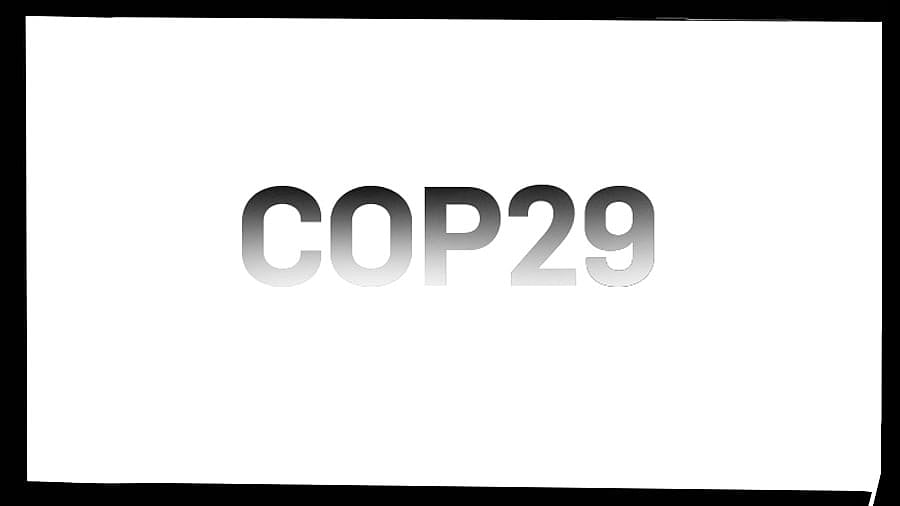
Amidst increasing frequency and intensity of extreme weather events like heat waves, air pollution, rising sea levels, floods, droughts, and wildfires, UNCCC’s COP29 at Baku, Azerbaijan, deliberated on a range of issues including climate finance, carbon market, and transition to renewable energy.
Despite protests by vulnerable groups during the deliberations, developed countries only made an annual commitment of $300 billion by 2035, for mitigation and adaptation to face climate consequences, with no binding pledge for public funding. This means a continuation of the existing $100 billion commitment till 2035. The deal was adopted despite criticism from several nations, including India which rejected the agreement and said that without adequate support in terms of finance, technology, and capacity-building, the fight against climate change would be severely impacted. The outrage
over the deal summed up a failure of global efforts to mobilise concerted climate action.
A new collective quantified goal (NCQG) on climate finance was set and discussed during the meeting. Annual funds ranging from $1.3 trillion to $5 trillion were sought for mitigation efforts in vulnerable countries, but no developed country came up with any strategy to generate NCQG funds in the first week of the conference. The Global Carbon Budget has projected global CO2 emission of 41.6 Gt in 2024, as against 40.6 Gt in 2023. The emission in 2023 itself was a record, and according to the World Meteorological Organisation (WMO), 2023 was the hottest year in history. On the first day of the deliberations, WMO noted that the January-September 2024 global mean surface air temperature crossed the Paris Agreement threshold, recording 1.54° C above the pre-industrial average; 2024 is set to break the 2023 record.
Trump has already washed his hands off contributions to climate finance. Following his America First policy, the president-elect has announced increased tariffs on imports, abandonment of climate concerns, and deportation of illegal immigrants but has conveniently forgotten his predecessors’ misdeeds that led to alarming spikes in emission. Trump’s remarks that undermine climate action, like “drill, baby, drill”, have severely hurt populations vulnerable to climate change. Trump has picked, for his second term, Scott Bessent as Treasury Secretary; Bessent has announced the “3-3-3” plan aimed at a 3% economic growth, a budget deficit reduced to 3% of GDP, and increased domestic oil and gas production by 3 million barrels per day. Other developed countries and China have also planned to upscale oil and coal production. This would heighten the crisis and disrupt the lives of the vulnerable.
While the negotiations in the first week were stalled, the UN climate chief urged G20 countries meeting at Rio de Janeiro, Brazil, to boost funding for developing countries struggling with global warming. No concrete commitment was made by any G20 member in response, though the members admitted that trillions of dollars are needed. Many heads of states of G20 countries were in attendance but their response was unjust and immature. Except India, no G20 country is on course to fulfil the Nationally Determined Contributions in response to the Paris Accord. These countries have 85% of the global GDP and account for 80% of the cumulative global emission. The G20 communique stated intent to combat hunger and poverty, and for taxation of the super-rich, but failed to reiterate the global commitment made last year at COP28 in Dubai to accelerate the transition away from fossil fuels. They were also noncommittal towards providing adequate finance to vulnerable countries to fight the disruptions.
A skewed financial order
The most disturbing aspect of the Baku agreement is that it permits developed countries to include loans from the World Bank and other multilateral development banks for climate-related financial flow. The global financial system is such that the African countries pay four times more interest than the US and eight times more than the European nations. The system is profiting from poor nations’ climate vulnerability and the disparity has cast a shadow over the deal.
In a clear case of conflict of interest, lobbyists for fossil fuels and large agribusinesses found entry to the meeting and access to diplomatic negotiations. Small farmers, indigenous people, women, and local food producers who live in harmony with nature for generations were excluded. Pesticides and fertilisers are often derived from fossil fuels and have a severely adverse effect on biodiversity, soil and health.
COP29 also voted to clear a much-delayed agreement for the global carbon market, with its finer details to be supervised by a UN body. Carbon trading since 2005 has grown exponentially. Many dubious projects have claimed credit without actually absorbing/cutting the intended quantity of carbon. Now, a supervising body of the UN would be the arbitrator for the carbon market and monitor carbon removal and assess the projects. Merely taking up afforestation projects may not necessarily sequester the desired quantity of carbon; it may be required to nurture the trees and monitor growth. Carbon market is one of the ways to generate funds for adaptation and mitigation and has the potential to partly supplement NCQG.
With COP29 failing to reiterate the transitioning away from fossil fuels and to muster adequate climate finance, the focus will now shift to COP30, scheduled to be held in Brazil in 2025.
(The writer is a retired Principal Chief Conservator of Forests – Head of Forest Force, Karnataka)
(Disclaimer: The views expressed above are the author's own. They do not necessarily reflect the views of DH).